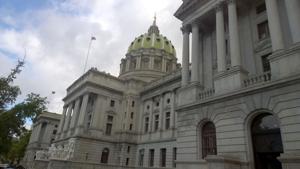Pennsylvania House advances measure banning private funds in elections

(The Center Square) – Legislation to ban private funding of Pennsylvania elections has passed the state House and now moves to the Senate for consideration.
House Bill 2044, sponsored by Rep. Eric Nelson, R-Westmoreland, would prohibit county and state elections officials from accepting private donations to administer elections.
The move was inspired by millions of dollars in grants to local election offices provided by nonprofits controlled by Facebook CEO Mark Zuckerberg during the last election cycle.
“This bill addresses a major concern brought forth during the 2020 election, that the lure of private money has seeped into the election system,” Nelson said. “Email evidence has proven Pennsylvania’s highest election officials notified specific counties of grant opportunities weeks before other counties were made aware. Our state’s highest offices were vulnerable to perversion by deep pockets with private election contracts. It is just plain wrong, and this bill will stop it.”
Republicans in the House State Government Committee highlighted in November $35 million in grants from nonprofits, including the Center for Tech and Civic Life, controlled by Zuckerberg and his wife, Priscilla Chan, to help administer elections in 24 of the state’s 67 counties.
The vast majority of the money was directed to five counties in highly Democratic districts, which received nearly $9 per registered voter compared with other counties that received less than $2 per registered voter, House Republicans said.
The Center for Tech and Civic Life distributed the grants to 2,500 election offices nationwide to fund a variety of work and equipment for the 2020 election, including protective gear for poll workers, public education campaigns on new voting methods, voting equipment, drop boxes and additional manpower, among other expenses.
In states such as Louisiana, officials ordered state election officers to turn down the grants. Other states, including Georgia and Texas, have passed laws that require donations to go through the secretary of state to be distributed. Arizona, Kansas and Iowa, meanwhile, banned the donations altogether.
“Harrisburg’s job is to make certain that polls are accessible to every voter and that elections are held freely and fairly,” Nelson said. “Harrisburg’s job is not to funnel private election dollars to cherry-picked counties. Eliminating these kinds of grants is a strong means to maintaining election integrity.”
Rep. Scott Conklin, D-Centre, argued on the House floor Tuesday the money pumped into elections in 2020 wasn’t partisan and did not generate fraud. He urged the chamber to reject the legislation and to instead invest more tax dollars into elections to eliminate the need for private funds.
“You tell me where there was one instance of fraud. … We’re getting ready to do a bill that’s going to strip money out of helping counties and instead we’re going to make sure they are underfunded more than ever,” Conklin said. “I’m saying reject this. Let’s help out the counties, or better yet, let’s do an amendment on the next bill up. Let’s stop it and let’s fund these counties so we don’t have to use other money.”
Congressional Democrats requested $2 billion in the initial federal coronavirus aid bill in spring 2020 to cover additional election expenses during the COVID-19 pandemic, but the approved legislation ultimately included $400 million.
Republicans have decried the Center for Tech and Civic Life’s efforts to fill the gap because of how the money was distributed and the organization’s ties to the New Organizing Institute, a group that provided data and training to liberal activists, The Associated Press reported.
Center for Tech and Civic Life spokesperson Ben LaBolt told the news wire the Zuckerbergs would prefer elections remain publicly funded.
“When our nation’s election infrastructure faced unprecedented challenges last year due to the pandemic, Mark and Priscilla stepped up to close a funding gap and granted $350 million to the Center for Tech and Civic Life, a nonpartisan, 501 (c)(3) organization,” LaBolt said. “Mark made clear this was a unique effort to address the unprecedented challenge of the pandemic and his preference for elections to be publicly funded.”
The money spent through the Center for Tech and Civic Life was in addition to $69.5 million more spent through another Zuckerberg-funded nonprofit, the Center for Election Innovation and Research, which sent $13.2 to Pennsylvania, Rep. Jim Struzzi, R-Indiana, told his colleagues on the floor.
“Want to know how much money Indiana County received, the county that I represent?” he said. “None.
“So if we’re talking fair and equitable distribution of these funds, it simply did not occur. It went to specific areas for specific reasons, and to me that is unacceptable. It’s fundamentally wrong and it needs to stop today.”
The House sent HB 2044 to the Senate on a vote of 113-90.
Disclaimer: This content is distributed by The Center Square


